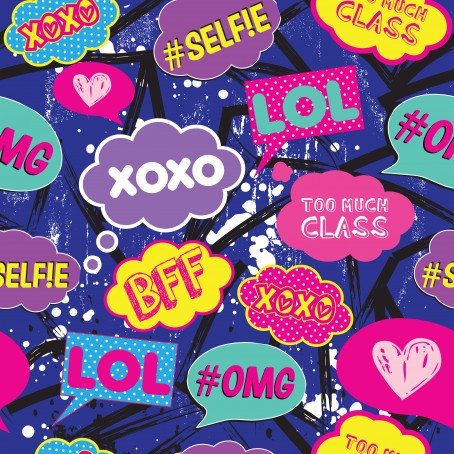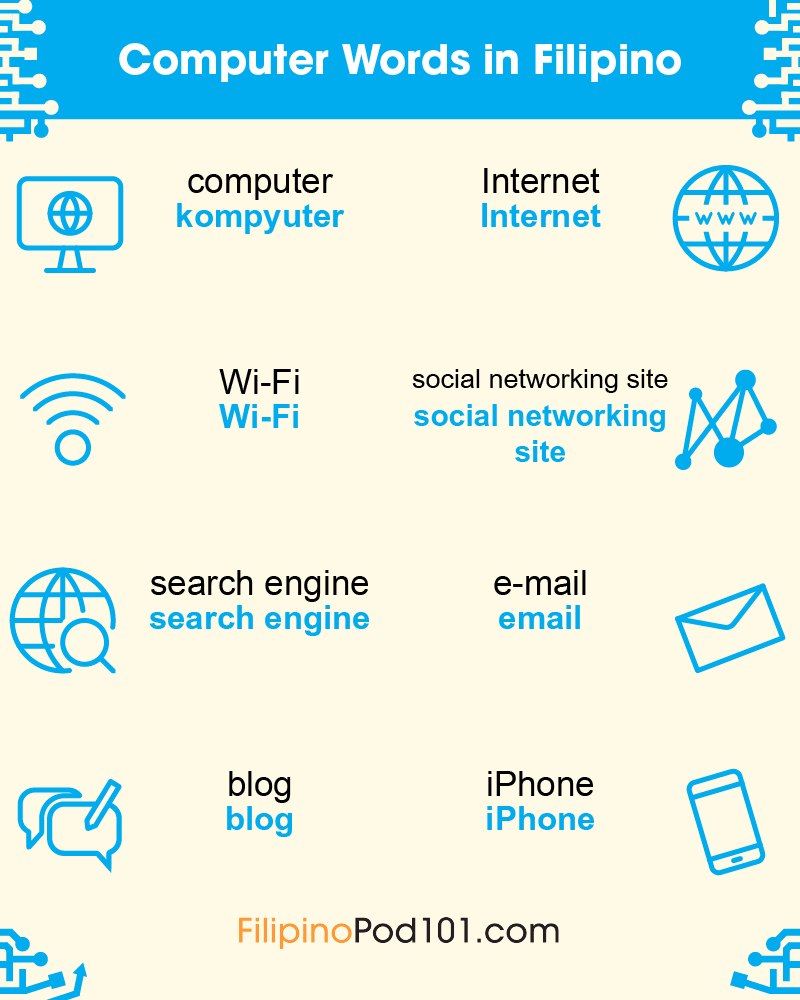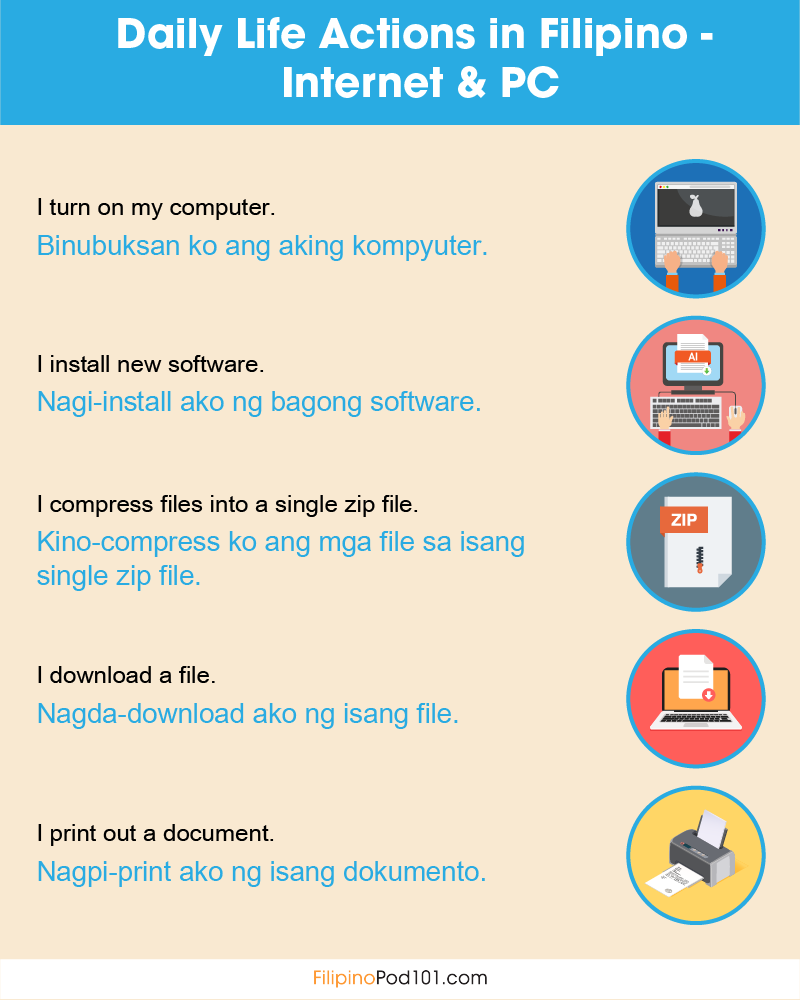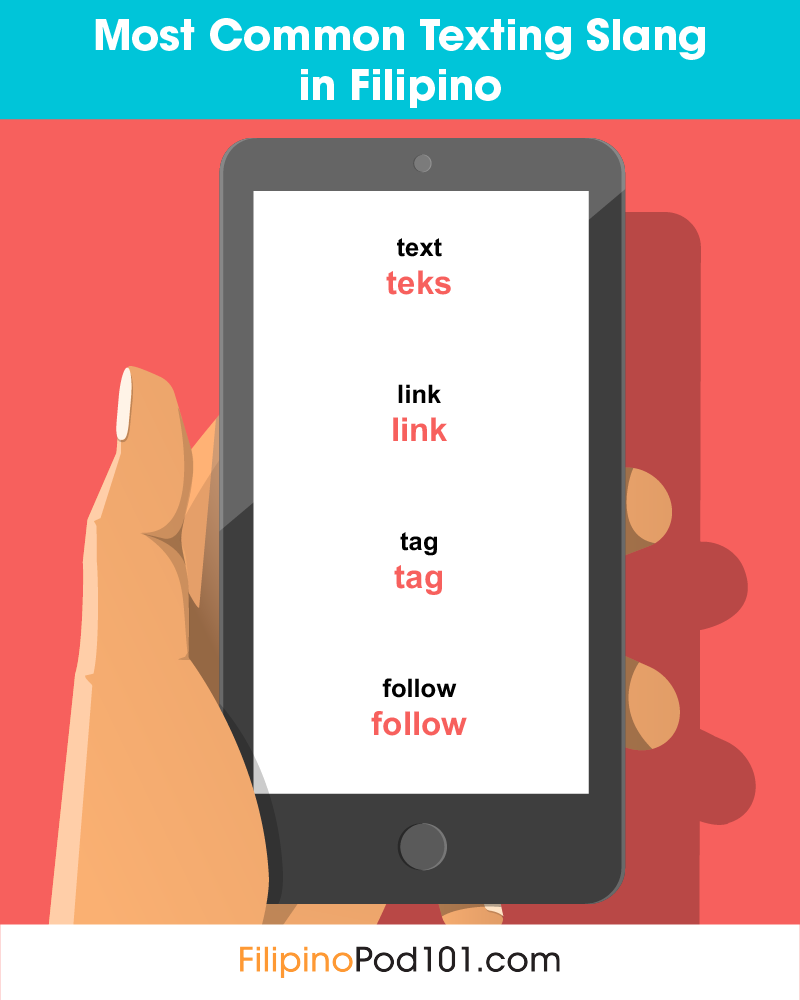The internet gives birth to different trends every now and then. Among them are internet slang words. Expressions like “ASL please,” “CTC?” and “BRB” used to dominate the internet chat scene, particularly during the era of mIRC and Yahoo! Messenger. Now that we have FB Messenger, Twitter, Viber, and WhatsApp, the list has been expanding and will probably continue to do so.
When sending Filipino text messages or chatting online, knowing the lingo is essential. There’s not a lot of internet slang words in Filipino, but the ones that do exist can be very useful to know when you’re communicating with Pinoy friends online or via text.
In the Philippines, there are Filipino slang words that have been around even before the internet. And then there are Tagalog Internet slang words, or those that were given birth through social media. In this article, we’ll focus on the latter.
But why is it so important to learn slang words used in Filipino text messages and chat rooms? Well, let’s just say you don’t want to be left clueless when chatting with friends in the Philippines, particularly with your millennial friends.
-
→ By the way, to learn more about Filipino slang, read our entry on how slang words can make you fluent in Filipino.
Table of Contents
- Philippines: Text & Net Capital of the World
- Most Common Internet/Text Slang
- When Shopping Online
- Online Gaming Language
- Multi-Layered Slang Words
- Ease the Confusion with FilipinoPod101
1. Philippines: Text & Net Capital of the World
The Filipinos are arguably among the most highly social people in the world. It’s probably the reason that you’ll find Pinoys in practically every country and region around the world. We simply love communicating, which is why it’s no surprise that the Philippines has been labeled as “The Text Capital of the World.” One can argue that it’s just because SMS is more affordable than voice calls in the Philippines, and that Pinoys are kuripot (stingy or just thrifty? It’s up to you to decide.), which is why most Pinoys prefer texting. SMS is indeed a cheaper option, but regardless, it can’t be denied that Filipinos have this deep sense of wanting to stay connected with their friends and loved ones, and one way they do that is through SMS chat.
But that’s not all. It seems that Pinoys want to up their reputation to another level, because just recently, the Digital 2019 report done by Social and Hootsuite has revealed that the Philippines is no longer simply the text capital of the world, but is also “The Net Capital of the World.” And that’s an impressive feat, considering that the country is one of the slowest on the planet in terms of internet speed. It seems to me that nothing will ever stop the Filipino people’s desire to stay connected to each other!
Now, without further ado, let’s move on to some of the most common Filipino slang words for text and the internet.
2. Most Common Internet/Text Slang
Filipinos are geniuses when it comes to inventing words and expressions. That said, the list of available Filipino internet and text slang words is so huge that we can’t make them fit in this short article. Nevertheless, we’ll do our best to provide you with the ones you’ll find most useful for everyday use.
Let’s begin!
1- Teks
We want to pay tribute to this very important word by putting it at the top of our list. Teks is the Filipinized form of the word “text,” which refers to a text message sent via Short Message Service (SMS). It’s not very common to see this word anymore, but it’s amusing to know that it’s the same length as its English spelling, “text.”
- Teks mo ako pag nakauwi ka na.
“Send me a text message once you get home.”
→ Don’t forget to visit our entry on the most common Tagalog texting slang.
2- Wer na u?
The expression Wer na u? first became popular as a form of textspeak. It’s the code-switching of the question, “Where are you now?” using a combination of English and Tagalog. It was adopted for the internet when social media sites like Facebook became popular.
It’s often followed by Hir na me, or “I’m here already.”
You use this Filipino text slang when you’re first to arrive at a rendezvous and would like to check on the location of the person (or people) you’re meeting.
- Guys, wer na u? Hir na me.
“Where are you, guys? I’m here already.”
3- Hir na me.
Just like the previous expression on the list, Hir na me is a form of code-switching, this time for the expression, “I’m here already.” It’s often preceded by Wer na u? although the order of the two is interchangeable. So instead of saying, Were na u? Hir na me, you can also say, Hir na me. Wer na u? In most cases, it can also stand on its own.
- Guize, hir na me. Bakit ang tagal ninyo?
“Guys, I’m here already. What’s taking you so long?”
Wer na u, guize? Tatlong oras na akong naghihintay!
(“Where the heck are you, guys? I’ve been waiting for three hours!” )
4- Guize
Speaking of guize, it’s the fourth word on our list, and as you already know from the previous example, it’s a Filipino slang word for “guys.” It’s believed to have been given birth by Jejenese, the sociolect of the Jejemons, which is a popular hipster culture in the Philippines.
- Guize, pasyal tayo kina Rain!
“Guys, let’s go to Rain’s place!”
5- OTW/OMW
This is not necessarily from the Philippines originally, but it’s a very popular Filipino slang. It’s shorthand for “On the way” and “On my way,” respectively.
- Guize, wait lang ha. OTW/OMW na.
“Please wait for me, guys. I’m on my way.”
6- GBU
Filipinos are a religious people, so we usually end our messages with a little blessing to our text or chat mates. GBU is short for God Bless U, which is text speak for “God bless you.”
- Ingat. GBU.
“Take care. GBU.”
7- OL ka ba?
Always wondering whether a friend is online or not? Asking them OL ka ba? is the best way to find out. OL is short for “online.” If someone wants to spend time chatting or texting with you, they’d readily reply with Oo, OL ako. (“Yes, I’m online.” )
8- SLR
What do you say to a friend if you’ve missed replying to their text or chat messages? Simple: SLR.
No, SLR doesn’t stand for “Single-Lens Reflex,” but rather “Sorry, late reply.” In most cases, this initialism is enough as a form of apology for not getting back right away to a friend who texted you.
- Besh, SLR. Na empty bat ako kanina.
“Hey girl, sorry if I replied just now. My phone died earlier.”
9- Besh
Since we’re at it, let’s talk about the word besh (sometimes beshie). The expression is simply a variant of the word bes, a word Filipinos use as a shortened form for “best friend.” Keep in mind that this expression is mostly used by females and very seldomly by males.
If you’re a male, we recommend that you use the expression pare or ‘tol instead. While pare is Tagalog for “buddy” or “dude,” ‘tol is the contraction of the Tagalog word utol, which itself is short for kaputol, meaning “sibling.”
Anyway, here’s another sentence using the word besh.
- Hi, besh! Kamusta ka na? Kailan tayo kakain dun sa bagong Korean restaurant?
“Hey, girl! How are you? When are we visiting that new Korean restaurant?”
10- Kyah
Kyah is a modern Filipino slang for kuya, which is Filipino for “big brother.” It can also be used to mean “sir,” and is used to refer to a male seller.
- Kyah, magkano po ang smartwatch?
“How much is the smartwatch, sir?”
3. When Shopping Online
With the global phenomenon that online shopping has become, it’s not very uncommon nowadays to see people selling things on social media. Filipinos, in particular, have taken advantage of this sensation and have themselves come up with their own set of online shopping expressions.
1- HM
HM is short for “How much?” Instead of typing the entire phrase, Pinoy online shoppers simply say HM when inquiring about the price of a certain product. On social sites like Facebook, for instance, you’ll often find the comment section of a particular item for sale flooded with HM from different users.
2- PM is the key
The next time you decide to sell that old sweater you’ve been wanting to get rid of for some time now and someone messages you with HM, you respond with “PM is the key.” PM is short for “Personal Message,” and it’s used to convey the fact that you want to keep the transaction private, and don’t want to disclose the price of the item in public.
- Buyer: Hi po. HM po ang sweater?
“Hi! How much for the sweater?” - You: PM is the key.
“Send me a private message for more details.”
3- LP
You’re browsing online for a pair of boots and you find just the exact pair you’ve been looking for. The price is a tad bit higher than what you can afford, though. What do you do? You click that private message button and type in LP? Of course, LP here doesn’t stand for “Long Playing,” which is another word for “album.” It stands for “lowest price,” and is an expression used for bargaining.
- Hi po. LP po ng boots?
“Hi. What’s the lowest price you’d accept for the pair of boots?”
4- SKL/FKL
SKL is short for Share ko lang. This expression is commonly used on social media whenever you want to share something online, such as important news, an update regarding a particular hobby, or just about anything you believe people will find interesting. It’s not necessarily an online shopping term, but a lot of people use it when sharing items they’ve bought online.
- SKL bago kong halaman na binili ko kahapon.
“Allow me to share this new plant I bought yesterday.”
FKL, on the other hand, stands for Flex ko lang. Flex is a slang term meaning “to show off.” It’s like when you want to show off your muscles by flexing them.
Pinoys usually use this Filipino internet slang by saying, Flex ko lang (insert anything you want to share here).
It works the same way as SKL.
- Flex ko lang itong bago kong Jordan shoes.
“Allow me to ‘flex’ my new pair of Jordans.”
→ Check our entry on the top 20 words you’ll need when using the internet.
4. Online Gaming Language
The Philippine online gaming industry has constantly been on the rise in the last decade, and is forecasted to continue growing. Along with its rise is, of course, the need to invent online gaming language, which is exactly what Filipinos did.
1- Dot-Dot
Dot-dot is the Tagalog slang for DOTA, or Defense of the Ancients, a multiplayer online game that first came out in 2003 and eventually became the go-to video game of many Filipinos, young and old alike. Unless you’re a DOTA player yourself, you probably won’t encounter this word a lot—but if you are, then it’s one of those Pinoy slang words you need to familiarize yourself with.
- Dot-dot pa more! Bagsak ka tuloy sa exam!
This is a sarcastic way of telling a person that he failed his test because of spending more time playing the popular video game rather than studying.
2- Rak na itu!
This expression means “Let’s rock!” It’s a kind of battlecry, motivating oneself and one’s team members to do their best, while at the same time not forgetting to have fun. It’s also another way of saying, “This is gonna be fun!”
3- Rapsi
The term rapsi is an alternative of the word rapsa, which is the Tagalog slang word for sarap (“delicious”). It’s an expression often used after gaining anything in the game that’s significant, such as an upgrade, a kill, or a special item.
- Rapsi nitong bagong armor ko!
“This new armor tastes good!”
4- Ge
Ge is short for sige, which means “sure” or “go ahead.” It’s something you say when you’re agreeing with someone about something. When invited to go on a quest, for instance, you say ge if you want to come.
- Gamer Friend: ‘Tol, teammates tayo.
“Hey, man. Let’s be teammates.” - You: Ge.
“Sure.”
5- Kati
Kati is the Tagalog word for “itchy,” and is used to describe a challenging opponent or quest. When faced with an opponent that produces high damage, for instance, you say:
- Ang kati naman nito.
“This guy’s tough!”
6- FTW
This is one popular internet slang word, so chances are that you’ve seen it floating around several times already. It’s an acronym for the expression, “For the win,” which was first used in the 60s American game show Hollywood Squares.
Today, online gamers use it after they’ve won a game, especially when they do it for a team. You can also use it when you’re inches away from victory. And it’s not only for gaming. You can also use it if you’re nearing the completion of a project you’ve been working hard on and wanted to share online.
7- GG
Always end a game in good spirits. Win or lose, never forget to say, “GG” after a game. It means “Good game.”
-
→ Do you know that playing games can help you learn faster? This post will show you the reasons why.
5. Multi-Layered Slang Words
And then there are multi-layered slang words, those Tagalog millennial words that need the likes of Sherlock Holmes to decrypt. The following Filipino millennial slang words highlight the genius of Filipino millennials when it comes to inventing new terms and expressions. Just a warning: Some of the words may be confusing at first. But you’ll eventually get the hang of it.
1- SHARKS
Sharks are basically marine animals, portrayed as fearsome creatures waiting for a swimmer to devour. But this isn’t that kind of shark. Sharks as an expression means “Let me see.” The connection isn’t clear at first, but here’s the explanation. The English word “shark” is translated as pating in Tagalog. “Let me see,” or “Can I see,” on the other hand, is patingin. Remove the last two letters and you’re left with pating, which in English is “shark.” Clever, ain’t it?
- Malamang maganda ang bagong phone mo. Sharks!
“There’s no doubt your new phone is to die for. Let me see!”
2- SALT
We all know salt as a condiment, but when it comes to popular internet slang words in Tagalog, salt means “as in.” The explanation is pretty simple. The Tagalog word for “salt” is asin, which sounds like “as in.”
- Nakakahilo ang mga bagong millennial words ngayon. Salt!
“This millennial talk is making me dizzy. As in!”
3- SAGS
Let’s go to Filipino tropical fruits this time. Whenever you hear someone use the expression SAGS, they’re implying that something is “forced” or “unnatural,” which in Tagalog is pilit. But what’s the connection? Well, sags is actually short for saging, which is the Tagalog word for “banana.” And what do you do with a piece of banana? Simple. You “peel it.” Get it? Peel it? Pilit? Oh well.
- Huwag naman masyadong sags ang ngiti mo.
“You don’t need to force your smile.”
4- SCOOBS
If you’re a 90s kid, or what Pinoys would refer to as Batang 90s, then you’re definitely familiar with Scooby Doo, the talking Great Dane who helps four teenagers solve mysteries involving the supernatural (or not so supernatural, really, if you know what I mean).
Well, the expression scoobs made its way to Millennial language because of him. When a Filipino teenager says scoobs, he’s actually saying “Hell no” or “Can’t be.” Here’s how that happened. Scooby Doo is a Great Dane, right? “Dane” sounds like dein or dehin, which is a slang word for hindi, which in Tagalog means “no” or “not.”
Here’s how to use one of the most popular Filipino slang words:
- Pupunta ka ba sa U2 concert?
“Are you going to that U2 concert?”Scoobs, bro! Alaws arep.
“I can’t, man. My budget isn’t enough.”
Alaws, by the way, is slang for wala, which means “none,” while arep is slang for pera, which is the Tagalog word for “money.”
I know. Please bear with me. We have one last word to decipher.
5- GUMPS
This word sounds like goosebumps, or worse, a name for some kind of disease. But, in reality, it simply means “thank you.” How did that happen? “Gumps” came from the word “Gump,” as in Forrest Gump. Yes, that 90s film that starred Tom Hanks. And Tom Hanks is T. Hanks. And T. Hanks is…you got it…thanks!
- Ang ganda ng suot mo!
“Your dress is beautiful!”Talaga? Gumps!
“Really? Thanks!”
6. Ease the Confusion with FilipinoPod101
It’s one thing to learn a new language, and it’s another thing to learn a new language within that new language you’re trying to learn. Wow! Even I got confused with that one! But hey, with FilipinoPod101, you can ease the confusion as you study Internet slang words in Filipino.
FilipinoPod101 isn’t your ordinary language-learning system. It provides students with new lessons regularly, so that whether it’s key Filipino phrases or conversation techniques you want to know more about, you can rest assured that there’s a fresh lesson for you to learn.
So, what are you waiting for? Sign up with FilipinoPod101 and gain access to exclusive Tagalog lessons, as well as useful blog articles like this one.
And before we forget, please don’t hesitate to share your thoughts with us in the comments section! What are popular internet and text slang words in your own language?
Until next time!




















